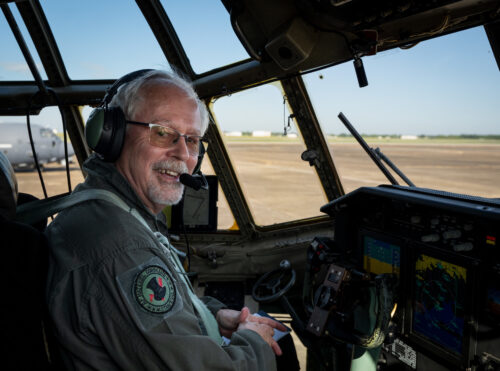Imagine spending over a year of your life, 416 days to be precise, soaring through the skies. That’s the remarkable feat accomplished by Gary Hogg, a civilian pilot for Air Force Material Command, who recently surpassed 10,000 flight hours in the legendary C-130 Hercules. This extraordinary milestone was reached on September 24, 2024, during a routine avionics modernization program test mission at Eglin Air Force Base, Florida.

Hogg’s enduring relationship with the C-130 began in 1983 at Little Rock Air Force Base, Arkansas, where his career path in aviation took flight. While initially captivated by aircraft like the RF-4 and the A-10 Thunderbolt II, Hogg’s heart truly belonged to the C-130. “I loved the concept of flying with a crew and the way everyone worked together to get the mission done,” he shared, reflecting on his early days with the aircraft.
A significant chapter in Hogg’s career unfolded during his time as a special operator, where he commanded C-130E and MC-130E Combat Talon models. This period was marked by numerous missions, including a particularly harrowing experience in 1993. Tasked with supporting 14 MH-53 Pave Low helicopters en route to Haiti amidst ferocious thunderstorms, Hogg and his crew faced a critical challenge. A separated helicopter, struggling to navigate the treacherous weather, required their assistance. Low on fuel themselves and with their intended landing site in Key West plunged into darkness due to a storm-induced power outage, the pressure mounted as Hogg attempted two landings, both unsuccessful. With fuel reserves dwindling, a successful third attempt was imperative, and Hogg skillfully guided his aircraft to safety. Relief washed over them as they learned that the MH-53 they had helped had also landed safely in Haiti.
Hogg’s tenure in special operations led him to the Air Force Special Operations Command standards and evaluation division, where he delved into the world of C-130 flight testing in 1993. This experience laid the groundwork for his second act as a civilian pilot, a role he seamlessly transitioned into following his retirement from active duty as a lieutenant colonel in 2004. His expertise grew as he commanded a variety of C-130 variants during his time at the aircraft’s depot at Robins Air Force Base, Georgia.
Today, as a civilian pilot for AFMC, Hogg’s dedication to the C-130 remains unwavering. He estimates that his 10,000 flight hours translate to an astounding two million miles flown. What fuels this enduring passion? Hogg points to the aircraft’s remarkable versatility and the dynamic nature of his work, stating, “Each model and variant can execute so many different missions, it is impossible to get bored with doing the same thing all the time.”
Hogg’s contributions extend far beyond piloting the C-130. As the standardization and evaluation command chief pilot, he plays a pivotal role in testing new changes and innovations, serving as a reservoir of knowledge for AFMC Det. 1 and its collaborative partner, the 417th Flight Test Squadron. Colonel Brian Taylor, AFMC Det. 1 commander, recognizes the immense value Hogg brings, stating, “He has experience flying every Air Force C-130 variant, and our unit leverages that experience and his relationships with the operational units, to oversee the diverse mission sets of the C-130 operations.”
Marking this incredible milestone, Hogg’s family and friends gathered on the flight line, eager to celebrate his achievement. Among them was his grandson, Anthony Lindstrom, who played a special role in marshalling the aircraft to its parking spot. Reflecting on his illustrious career, Hogg’s words encapsulate the essence of his passion, “The thought that keeps coming to me is how much I enjoy the team that it takes to fly a C-130. A smooth-running team is just pure joy in the air.”
For more information, hit the Source below